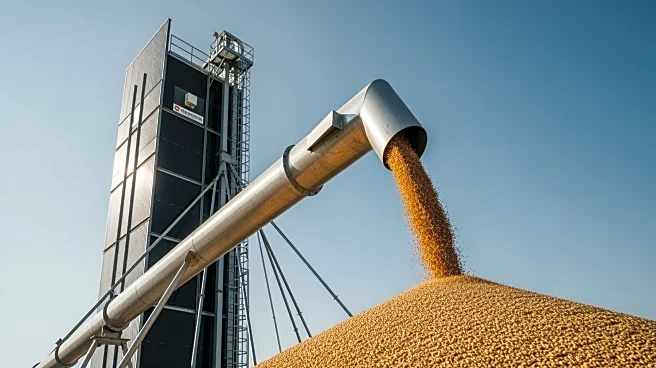What's Happening?
A South Korean flour milling group has purchased approximately 50,000 tons of milling grain from the United States at an international auction. The purchase includes various wheat varieties, such as 24,670
tonnes of soft wheat with a protein content between 9.5% to 11%, bought at an estimated price of $232.53 per ton FOB, and 2,780 tonnes of soft wheat with a protein content of up to 9% at $242.33 per ton FOB. Additionally, 10,405 tonnes of hard red winter grain with a minimum of 11.5% protein were purchased at $246.37 per ton, and 12,145 tonnes of dark northern spring rye with a minimum of 14% protein were bought at $261.11 per ton. The tender specifies shipment between January 15th and February 15th, 2026, with United Grain Corporation suspected to be the seller.
Why It's Important?
This purchase highlights the ongoing adjustments in global agricultural trade amidst geopolitical tensions, particularly the Ukraine grain corridor deal's impact on food security. The acquisition of U.S. wheat by South Korea underscores the strategic importance of diversifying grain sources to ensure stable food supply chains. As countries navigate the complexities of international trade, such transactions can influence market prices and availability, affecting stakeholders from farmers to consumers. The deal also reflects the adaptability of global trade networks in response to regional conflicts and supply chain disruptions.
What's Next?
The shipment of the purchased wheat is scheduled between January 15th and February 15th, 2026. This timeline allows for logistical preparations and potential adjustments in response to market conditions. Stakeholders, including traders and milling companies, will likely monitor price fluctuations and supply chain developments closely. The transaction may prompt other countries to explore similar deals to secure their food supplies, potentially influencing global wheat market dynamics.
Beyond the Headlines
The purchase of U.S. wheat by South Korea may have broader implications for international trade relations and agricultural policies. It could encourage other nations to reassess their grain sourcing strategies, considering geopolitical risks and supply chain resilience. Additionally, this transaction might stimulate discussions on the sustainability and environmental impact of global grain production and transportation.










